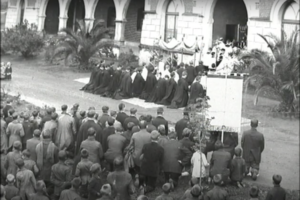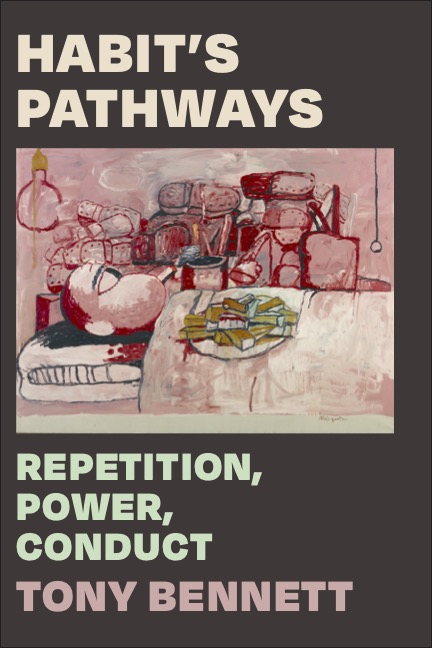
The merits and shortcomings of habit’s repetitions have often been assessed via metaphors of pathways. Bruno Latour (1947-2022) praised habit as “the patron saint of laid-out routes, pathways, and trails.” Imagining a lost hiker who, hesitating at every step wondering which way to go, comes across “a trail already used by others,” Latour interpreted this as an encounter with “the extraordinary blessedness of habit … he knows what to do next, and he knows it without reflecting.”
By contrast, for John Dewey (1859-1952), habit binds the traveller’s mind so completely to “the routineer’s road” that it becomes a “ditch out of which he cannot get … directing his course so thoroughly that he no longer thinks of his path or destination.” It is only when this path is “thwarted by untoward circumstances” that the routineer, in being forced “to stop and think,” is freed from “following a beaten path” to break “a new road through strange lands.”
Habits in history: not for savages, children or paupers
John Locke (1632-1794) had earlier combined these two versions of habit’s pathways. While habits “once set a-going” marked “a smooth path” in which motion became “easy and, as it were, natural,” he also urged that habit be suspended for conduct to be set off along a new course. This idea was central to his conception of freedom.
Only when habit’s repetitions are stalled and we are “standing still, where we are not sufficiently assured of the way,” can we then, by “consulting a guide,” embark on a new path by “following the direction of that guide.”
Locke limited this possibility chiefly to men of reason, excluding savages, idiots, lower-class children, servants, and paupers in view of what he saw as their relative insensitivity to environmental changes.
These limitations are an instance of the “politics of gapped time” in which the ability to stall habit’s repetitions and embark along new paths is selectively distributed.
This had a precedent in earlier Christian Europe when spiritual elites nurtured in monastic culture believed that habit’s repetitions, when guided by the pastorate, marked a pathway to grace. Habits were distinguished from custom as a form of routinised training applied to peasants, artisans and pagans.
Enter: the physiologist, psychologist & social worker
For Locke, the philosopher replaced the pastor in forming or changing habits.
Nineteenth-century developments in physiology, psychology, and neurology located habit’s pathways in the body’s nervous, muscular and neurological systems.
This generated the new phenomena of unwilled habits associated with the figure of the addict whose course down habit’s descending pathways could only be reversed through the intervention of a new set of authorities: the physiologist, the psychologist and the social worker.
The politics of gapped time in this era depended on identifying where, how and when the rigours of habit’s repetitions—inscribed now in the chains of neurophysiological causation—might be interrupted and how, in the resulting intervals, these scientific authorities might intervene to direct new behaviours.
The power of habits: to discipline & marginalise
Unwilled habits also have a history in which their power, rather than being loosened, has been reinforced through the mechanisms of labour discipline. These have taken different forms. For the factory worker the dulling effects of habit’s repetitions constituted a well-worn pathway that led, in Marx’s estimation, to a pending reduction of the worker to animality. For Achille Mbembe (1957 – ) habit’s pathways led to the slave’s eventual death and destruction as a capital asset.
Evolutionary theory—initially the work of Jean-Baptiste Lamarck (1744-1829) and, later, that of Charles Darwin (1809-82)—prompted a parallel shift in which habits marked a path to the transgenerational accumulation of enhanced capacities. The habits acquired in one generation were considered to pass to the next in an instinctual inheritance comprising the “connective tissue of civilisation.”
But again, these benefits only accrued to some people—the main exceptions being Indigenous peoples.
Their alleged conservatism was attributed to the failure of the evolutionary dynamic of habit to kick in with sufficient vigour to generate change. Instead, it produced only a thin layer of habits whose endless repetition over millennia had acquired an unusually binding grip on Indigenous culture and conduct.

There are many versions of habit’s pathways with multiple and often intersecting political implications. An Indigenous television documentary, The Habits of New Norcia (2000), revealed the racially divisive functions of habit in the West Australian monastic community of New Norcia.
Habit’s role in cultivating an elite and white spirituality was foregrounded in depictions of the routines of monastic life. The testimony of members of the Stolen Generations, who were taken to the abbey’s orphanage to be ‘rescued’ from their stalled progress along habit’s civilising pathways, also detailed their subjection to daily regimes of discipline and punishment that trained them as a source of free labour for the monastery’s agricultural estate and neighbouring landowners.
The present: self-appointed habit experts
Much like our daily habits, we tend to take the concept of habit for granted. We shouldn’t. It’s a very bad habit!
There are now legions of self-appointed habit experts seeking to manage our behaviour in ways that perpetuate the politics of gapped time. The authors of Nudge favour the subconscious manipulation of our habits over self-reflective mechanisms of change. They reserve the latter for the few of Star Trek’s Mr Spocks amongst us (those making reflective, rational, controlled and conscious decisions) while urging the former for the more numerous Homer Simpsons (those prone to easy, quick and unconscious decisions… “doh!”).
I am more in favour of considering everyone a potential Spock.




